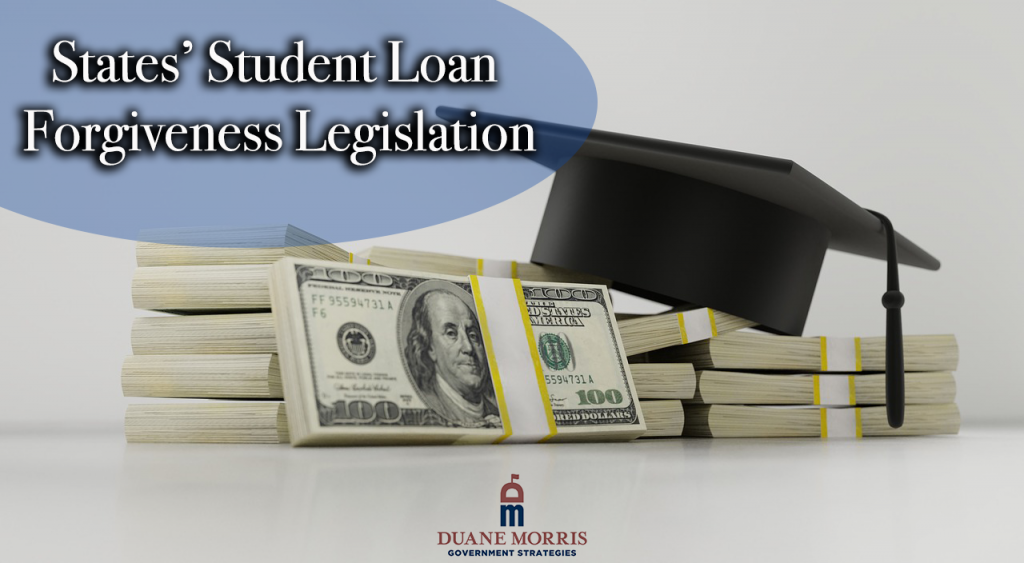
There is currently a significant discussion in Congress regarding student debt and student loan forgiveness. Before leaving office, former President Donald Trump’s Administration paused federal student loan payments through January 31, 2021. In one of President Joe Biden’s first acts upon assuming office, the Administration extended the pause on federal student loan payments and collections. The Biden Administration also kept the interest rate at 0% through at least September 2021. Could Biden continue to address student loan debt through further executive action? Or could Congress take action via student loan forgiveness legislation?
Federal Student Loan Forgiveness Legislation and Data
According to the Federal Reserve, federal and private student loan debt as of June 2020 totaled $1.67 trillion. Other reports show 92% of student loans are owned by the U.S. Department of Education, accounting for $1.54 trillion from 42.3 million borrowers. Further, 62% of the college class of 2019 graduated with student debt, averaging $28,950.
Some Democratic lawmakers, including Senate Majority Leader Chuck Schumer (D-NY), Senator Elizabeth Warren (D-MA) and Congresswoman Alexandria Ocasio Cortez (D-NY), believe that President Biden should take further action related to federal student loan forgiveness, forgiving up to $50,000 of debt per borrower via executive action. President Biden, meanwhile, has indicated an openness to forgiving $10,000 and prefers Congress to reach an agreement, via student loan forgiveness legislation, on additional steps to reduce the economic impacts of excessive student loan indebtedness. More than a third of borrowers owe $10,000 or less in federal student debt.
As the federal government mulls action on improving educational attainment and student loan indebtedness, state legislatures and education departments have taken various steps in recent years related to student loan debt, loan forgiveness, and debt education. They are likely to continue to do so in 2021.
Pennsylvania Student Loan Forgiveness Legislation, Income Share Agreements, and Student Borrowers’ Bill of Rights
1,775,300 Pennsylvanians have a total of $62.5 billion in federal student loans. 533,900 (30.0%) would have their entire student debt forgiven under a $10,000 federal plan.
Pennsylvania lawmakers have introduced a myriad of legislation related to student loan forgiveness. One legislative package in the Pennsylvania State Senate aims to address the student loan debt crisis through income share agreements. The package’s first bill would provide a refinancing opportunity to Pennsylvanian graduates with significant student loan debt by creating the Student Loan Retirement Agreement Program. The program would allow borrowers to meet their obligations and repay student loans through the use of Income Share Agreements (ISAs), where a participant would commit to paying a specific share or percentage of their income for a period to pay off their loan. The second bill in the package would focus on how students could utilize ISAs by authorizing and directing a study of the desirability and feasibility of using ISAs to finance a portion of the cost to attend college in Pennsylvania and for Pennsylvania citizens to attend college in other states. Both bills are awaiting consideration in the Senate Education Committee.
Another bill being introduced would create a Student Borrowers’ “Bill of Rights.” The bill would guarantee that student loan borrowers have access to accurate information about their loan and all repayment options, stronger state oversight of lenders from the Department of Banking, and an ombudsman whose only responsibility is to assist borrowers.
Other legislation introduced so far this session would create loan forgiveness for certain professions, including graduates entering the mental health intellectual disability and drug/alcohol treatment professions, dentists, optometrists, child welfare workers, and nurses. Another bill, HB 226, would provide Pennsylvania nurses and personal care and assisted living facility employees with student loan forgiveness.
Texas Loan Repayment Legislation
3,480,200 Texans have a total of $113.7 billion in federal student loans. 1,191,900 (34.2%) would have their entire student debt forgiven under a $10,000 federal plan.
In Texas, Governor Greg Abbott signed Senate Bill 16 into law in 2019, creating the Peace Officer Loan Repayment Assistance Program. The student loan repayment assistance program is for peace officers who have served four consecutive years and agreed to continued employment as a peace officer in Texas for at least four more years. An eligible peace officer must have completed an undergraduate or graduate program. Loans eligible for repayment assistance must be for education at a post-secondary institution, be a state or federal guaranteed student loan, or another loan that required the funds to only be used for expenses incurred by a person in attending a post-secondary educational institution and cannot be in default. Senate Bill 16 allows for no more than $20,000 of repayment assistance to an eligible person.
One bill introduced in the 87th Texas Legislature would reinstate the Texas B-On-Time student loan program. Senate Bill 35 would reinstate the program, which offered zero-interest student loans that could be forgiven for students who earned their degrees on time and with a GPA of 3.0 or better.
New Jersey Student Loan Forgiveness Legislation
1,154,000 New Jersians have a total of $40.5 billion in federal student loans. 364,100 (31.6%) would have their entire student debt forgiven under a $10,000 federal plan.
In the current legislative session, A4396 was introduced to establish the Frontline Health Care Worker Loan Forgiveness program. The program would provide for the forgiveness of New Jersey College Loans to Assist State Students loans and private student loans of frontline health care workers who provide COVID-related health care services in New Jersey.
The bill defines “COVID-related health care services” as any health care services that relate to the diagnosis, prevention, or treatment of COVID-19, including through telehealth services, the assessment or care of the health of a person related to an actual or suspected case of COVID-19 including through telehealth services, or patient care in a setting where there is a reasonable expectation of risk of exposure to COVID-19.
Identical bills A2496 and S2426, the Know Before You Owe Student Loan Debt Act, would require higher education institutions to send out annual student debt letters and require students enrolled in such institutions to complete a student loan debt repayment course.
Specifically, the bills would require higher education institutions to send out letters to students that include information such as the estimate of the total amount of student loans taken out by the student, an estimate of the potential total payoff amount, an estimate of monthly repayment amounts including principal and interest amounts, a warning that the higher the borrower’s debt-to-income ratio is, the more difficult the borrower is likely to experience in repaying their loans, information concerning options for reducing borrowing (i.e., scholarships, reduced expenses, work-study), and more.
The bills would also require full-time undergraduate students who have student loan debt to complete an online course or receive in-person counseling from a qualified member of their educational institution on student loan debt repayment and the consequences of the failure to make required payments. Additionally, the bill would require the course or counseling during the student’s final semester before graduation.
Florida Student Loan Repayment Legislation
2,513,100 Floridians have a total of $95.9 billion in federal student loans. 792,400 (31.5%) would have their entire student debt forgiven under a $10,000 federal plan.
HB 115 was signed into law in 2020, becoming the Keep Our Graduates Working Act. The bill prohibits any state authority, including DOH, from denying the issuance of, refusing to renew, suspending, or revoking a professional license based solely on the licensee being delinquent on payment of or defaulting on their student loans.
The bill, which became effective July 1, 2020, also:
- Repeals authorization for DOH to discipline a health care practitioner for failing to repay a student loan and the associated mandatory discipline;
- Repeals the requirement that DOH issue an emergency order suspending a health care practitioner’s license for a student loan default, absent timely proof of a new repayment plan; and
- Repeals the requirement that DOH obtain a monthly list from the USHHS of the health care practitioners who have defaulted on their student loans.
In the current legislative session, SB 1472 and HB 147 would create the Assistant State Attorney and Assistant Public Defender Student Loan Repayment Program. The purpose of the legislation is to increase the employment and retention of both assistant state attorneys and assistant public defenders. The following requirements must be met to be eligible to participate in the program:
- Be a member in good standing with the Florida Bar;
- Be employed full-time by a state attorney or public defender in Florida;
- Have completed no more than a total of 10 years of continuous service as an assistant state attorney or assistant public defender;
- Be earning a salary less than $65,000 as an assistant state attorney or assistant public defender;
- Not received any disciplinary action from the Florida Bar;
- Have an unsatisfied student loan that was issued or guaranteed by a state or the federal government; and
- Not be eligible for any other state, local, or federal grant or private fund that assists in student loan repayment.
Annual payments would be made under the bill as follows: $3,000 if the individual has a total of at least 4 years but no more than 7 years of continuous service as an assistant state attorney or assistant public defender, or $5,000 if the individual has a total of more than 7 years but no more than 10 years of continuous service as an assistant state attorney or assistant public defender.
Rhode Island‘s Student Loan Bill of Rights
137,700 Rhode Islanders have a total of $4.4 billion in federal student loans. 46,800 (34.0%) would have their entire student debt forgiven under a $10,000 federal plan.
Rhode Island Governor Gina Raimondo signed the state’s Student Loan Bill of Rights into law in 2019. The new law requires student loan servicers to register with the state, allows state regulators to examine servicers’ business practices, and allows the state Attorney General to mediate complaints on behalf of borrowers and enforce violations under the Deceptive Trade Practices Act. Lawmakers’ goal for the Student Loan Bill of Rights was to establish oversight of the student loan process and prohibit predatory practices.
Specifically, the responsibilities of student loan services under the bill include, but are not limited to:
- Providing annually, and at the request of a student loan borrower, the terms of their loan, progress toward repayment, and eligibility for any loan relief programs include income-driven repayment plans, public service loan forgiveness, forbearance, and deferment.
- A student loan servicer shall establish policies and procedures, and implement them consistently, to facilitate the evaluation of private student loan alternative repayment arrangement requests, including providing accurate information regarding any private student loan alternative repayment arrangements that may be available to the borrower through the promissory note, or that may have been marketed to the borrower through marketing materials.
- A private student loan alternative repayment arrangement shall consider the affordability of repayment plans for a distressed borrower, as well as the investor, guarantor, and insurer guidelines, and previous outcome and performance information.
- If a student loan servicer offers private student loan repayment arrangements, a student loan servicer shall consistently present and offer those arrangements to borrowers with similar financial circumstances.
- If a borrower inquires of a servicer of private student loans about consolidating or refinancing a federal student loan into a private student loan, the servicer of private student loans must disclose in advance of the refinancing or consolidation, any benefits or protections exclusive to federal student loans that may be lost as a result of the consolidation or refinancing.
- A student loan servicer shall respond to a written inquiry from a student loan borrower, or the representative of a student loan borrower, within ten (10) business days after receipt of the request, and provide information relating to the request and, if applicable, the action the student loan servicer will take to correct the account or an explanation for the student loan servicer’s position that the borrower’s account is correct.
Latest News
Photo credit: iStock.com/Naypong The rise of Name, Image, and Likeness (NIL) rights has revolutionized collegiate athletics, empowering student-athletes to monetize their personal brands while maintaining eligibility, something we previously covered in 2023. Since California's groundbreaking [...]
Photo credit: iStock.com/runna10 Every year in the United States, a growing number of teachers leave their positions. While there are multiple reasons for this alarming trend, many teachers point to inadequate compensation as a significant [...]
Photo credit: iStock.com/yacobchuk The use of cell phones by students in classrooms is on the rise, despite 77% of schools prohibiting cell phones at school for non-academic use. With students often disregarding these rules or [...]
Photo credit: iStock.com/SeventyFour According to the Centers for Disease Control and Prevention (CDC), the number of adolescents reporting poor mental health is on the rise. A 2022 CDC report showed that 37% of high school [...]






Stay In Touch